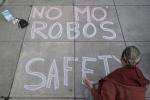Despite vocalized safety concerns, rival robotaxi services Cruise and Waymo will be allowed to operate around the clock in San Francisco following a controversial vote by California's Public Utilities Commission.
The agency's panel, which consists of five commissioners in total, approved the expansion Thursday by a 3-1 vote, according to the Associated Press. Commissioner Karen Douglas was absent from Thursday's hearing for an undisclosed reason.
The approval makes San Francisco the first major U.S. city with two fleets of driverless vehicles competing for passengers against human-operated taxi and ride-sharing services.
Some city officials and residents made it clear they are not yet on board with the robotaxis at Thursday's meeting after growing frustrations with the vehicles, which Cruise and Waymo have been testing on a restricted basis in the city over the past year.
SELF-DRIVING CAR COMPANIES ZOOM AHEAD, LEAVING U.S. REGULATORS BEHIND
During nearly six hours of public comments, opponents cited recurring problems with the unmanned cars, such as unexpected stops and erratic behavior that would ultimately block traffic, including emergency vehicles. Other complaints included frustration over San Fran becoming a "tech playground" and an "ant farm" for haphazard experimentation, the AP reported.
Robotaxi supporters disagreed with those claims, describing the driverless vehicles as a leap forward that keeps the city ripe with the latest in technology. They also noted that driverless vehicles provide additional ways for disabled people and drunken drivers to get around town.
One speaker said robotaxis will contribute to the city's tourism, predicting that they will garner enough interest from visitors as the famed cable cars. Waymo seemed to solidify that claim by sharing that the company has a wait list of more than 100,000 people who want to take a driverless cruise through the city.
SAN FRANCISCO'S DOWNTOWN 'NEVER GOING BACK TO THE WAY IT WAS,' SALESFORCE'S MARC BENIOFF SAYS
After spending billions of dollars over several years to develop the technology, both Cruise – a subsidiary of General Motors – and Waymo – a spinoff from a secret project at Google – saw Thursday's approval in San Fran as a major victory, likely leading to the launch of similar services in other large, congested cities.
"We can’t wait for more San Franciscans to experience the mobility, safety, sustainability and accessibility benefits of full autonomy for themselves — all at the touch of a button," Waymo co-CEO Tekedra Mawakana said in a blog post.
According to the AP, Cruise has been testing 300 of the vehicles during the day free of charge and 100 at night for a fee in less congested parts of the city over the past 14 months while Waymo has been allowing about 100 vehicles be used for volunteers and employees.
In an attempt to shut down concerns, both companies cited unblemished safety records when trying to prove robotaxis are less dangerous than distracted, intoxicated and bad drivers.
SAN FRANCISCO LOSES ANOTHER LARGE DOWNTOWN BUSINESS AS CITY'S TROUBLES MOUNT
San Francisco Fire Department Chief Jeanine Nicholson disputed the companies' driving records during a Monday meeting ahead of the vote, citing 55 written reports of robotaxis interfering with emergency response.
"They are still not ready for prime time because of the way they have impacted our operations," Nicholson said.
Other city leaders wrote letters to state regulators in recent months in an attempt to dissuade them from approving the expansion – to the point where two previously scheduled votes in June and July were postponed.
A May 31 letter from San Francisco's transportation leaders described the driverless vehicles as technology "that is not ready for unconstrained commercial deployment," while a June 22 letter from Tracy McCray, the president of the San Francisco police union, warned that the vehicles could cause "dangerous situations" after a robotaxi obstructed emergency response to a mass shooting where nine people were injured.
"While we all applaud advancements in technology, we must not be in such a rush that we forget the human element and the effects such technology unchecked can cause in dangerous situations," McCray wrote. "Delays of even seconds in our line of work can be a matter of life or death."
GET FOX BUSINESS ON THE GO BY CLICKING HERE
Nico Larco, who has been tracking the progress of autonomous vehicles as director of the University of Oregon's Urbanism Next Center, piled on to the concerns by stating the expansion could cause "a real public sentiment risk."
"If they don't figure some of these things out, there will be growing frustration from the general public," Larco stated to the AP. "And it's tough to bring that back and put the genie back in the bottle."
The Associated Press contributed to this story.














